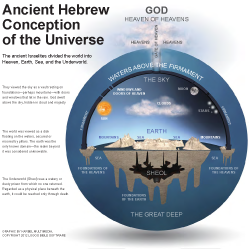14:1–22 This is the last part of Job’s long speech (Job 12:1–14:22). In it he reflects on human suffering (vv. 1–12) and death (vv. 13–22). |
14:2 Like a flower The analogy of a flower and shadow was a common way to illustrate the brevity of human life (see 7:7 and note; 8:9; Pss 102:11; 103:15–16; Eccl 6:12; Isa 40:6–8).
14:3 on such a one you fix your eyes Job asks God why He feels the need to watch people so closely since human life is so short and frail (compare Psa 143:2).
14:4 Who can bring a clean thing from an unclean thing Expresses an impossibility.
14:5 his days are determined Job seems to be indicating that humanity cannot exceed the limits placed on a human life (Gen 6:3). However, Job could also be expressing a belief that the particular length of a person’s life is already decided (Psa 139:16).
14:6 let him desist Because people’s time is limited (Job 14:5), Job wishes God would turn His gaze away and allow people to live their lives while they can.
14:7 then it will sprout again After discussing the brief nature of human life, Job considers life after death using the image of a tree. He says that trees have hope because they can grow back after being cut down, and laments that humans do not experience the same renewal (vv. 10–13).
using the image of a tree. He says that trees have hope because they can grow back after being cut down, and laments that humans do not experience the same renewal (vv. 10–13).
14:10 a man dies, and he dwindles away Job concludes that people do not share the same hope as trees: they cannot regrow. However, in the following verses, he seems to express belief in the possibility of restoration after death (see note on vv. 13–14).
14:11 a river withers away Job continues using analogies from nature, comparing human mortality to rivers and lakes that dry up in the dry season.
14:12 he does not arise Job is unsure of what happens after death, but he seems to be speculating about the resurrection of the dead and perhaps even final judgment. Compare Rev 20:11–21:4.
14:13 Sheol The Hebrew text here uses the word she’ol. This term, often transliterated in English translations as Sheol, is a reference to the underworld according to Hebrew thought, the place where the dead go (see note on 1 Kgs 2:6). Earlier, Job spoke of death as a place of rest, even for the wicked (Job 3:17–19). He also indicated that those who went to the realm of the dead could not return (7:9). Here, he seems to wish for a temporary asylum in Sheol. After the passing of God’s wrath, then God would restore him (compare note on v. 12).
 Old Testament Theology of the Afterlife
Old Testament Theology of the Afterlife
Sheol |
14:14 my relief The Hebrew word used here, chaliphah, comes from the same word as Job’s description of the tree’s regrowth in Job 14:7. There, Job expressed doubt that humanity could hope to regrow like the trees. Here, he indicates that renewal from death is possible. Job may be expressing belief in the resurrection, after his visit to the realm of the dead (compare Dan 12:2 and note; compare Job 14:12).
14:16 you would not keep watch over my sin Job hopes that, once he is renewed, God will no longer keep such a close eye on his sins. In vv. 16–17, Job uses the same three terms for sin as he does in 13:23. See note on 13:23.
14:18 a mountain falls Job abandons hope for restoration, saying his hope is like the erosion of mountains (v. 19).

|
About Faithlife Study BibleFaithlife Study Bible (FSB) is your guide to the ancient world of the Old and New Testaments, with study notes and articles that draw from a wide range of academic research. FSB helps you learn how to think about interpretation methods and issues so that you can gain a deeper understanding of the text. |
| Copyright |
Copyright 2012 Logos Bible Software. |
| Support Info | fsb |
 Loading…
Loading…


 Sheol
Sheol